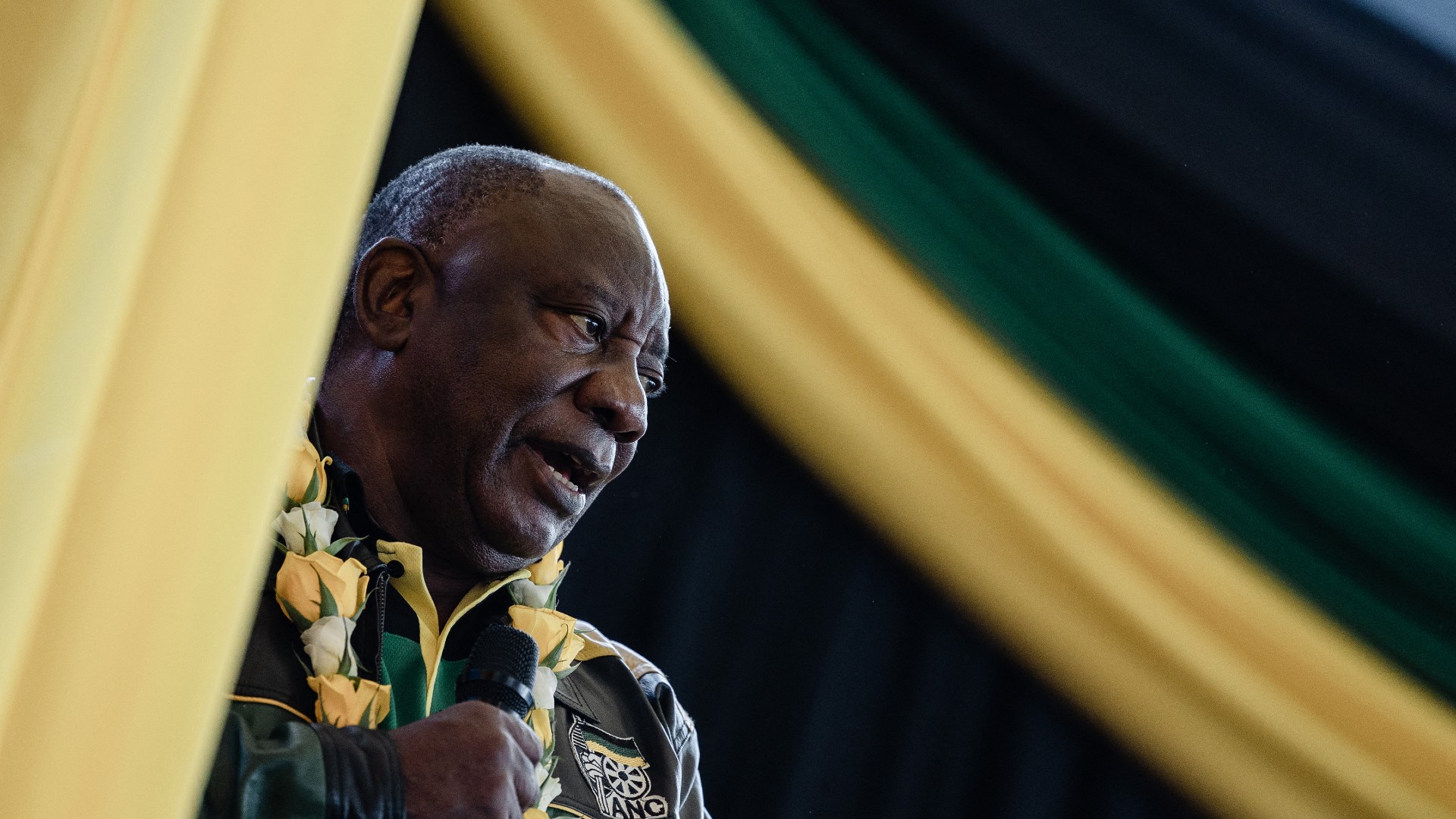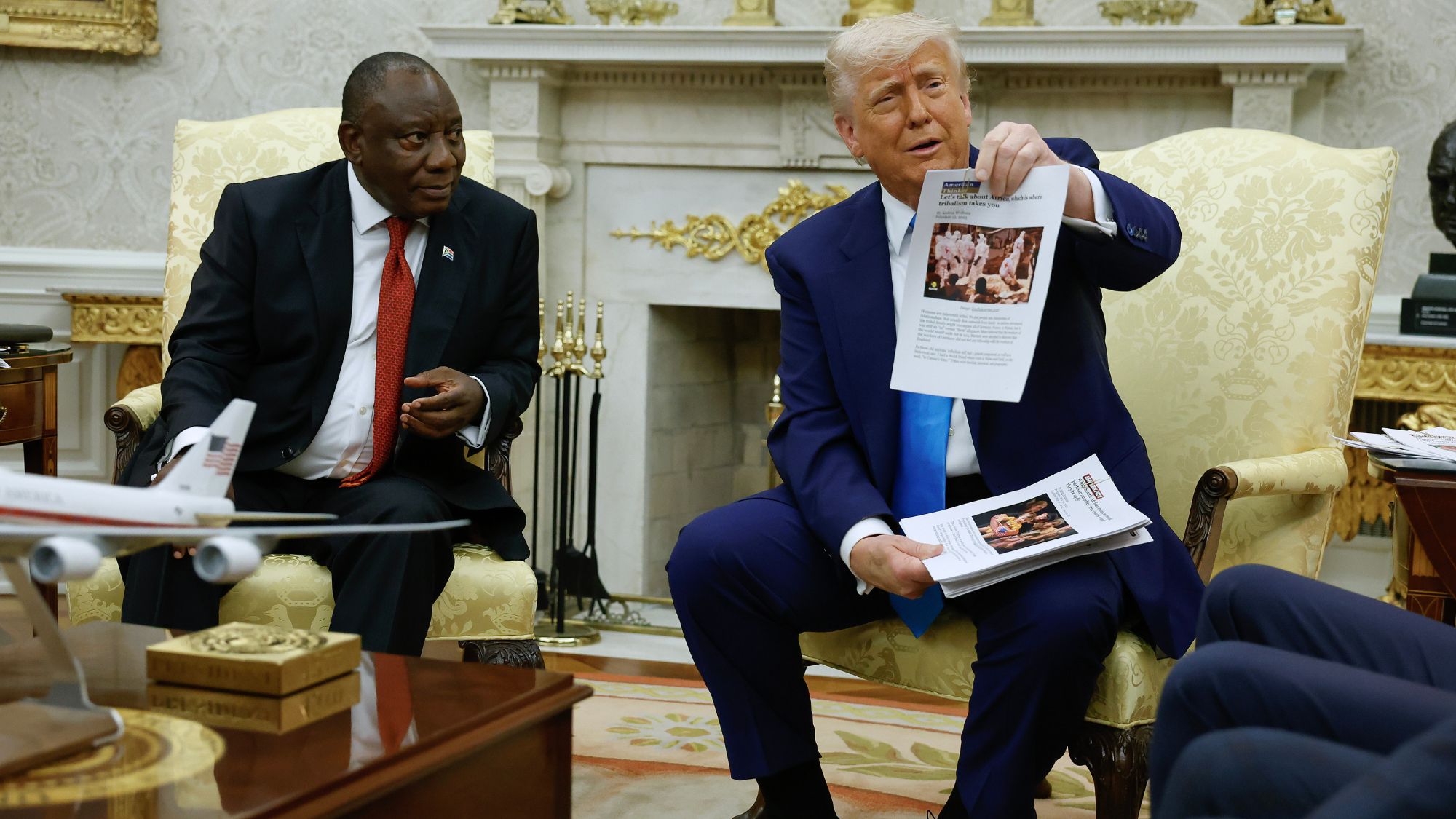Can the ANC win South Africa's pivotal 2024 election?
Governing party on course to lose majority for first time since end of apartheid as 'economic chaos trumps nostalgia'

A free daily email with the biggest news stories of the day – and the best features from TheWeek.com
You are now subscribed
Your newsletter sign-up was successful
Cyril Ramaphosa has fired the starting gun for a general election that is widely viewed as the most consequential in South Africa since the end of apartheid 30 years ago.
The current president is looking to drum up enthusiasm for his ruling African National Congress (ANC) party, which has governed since the advent of democracy in 1994. But next year's vote comes as the country is grappling with economic chaos, sky-high unemployment, rampant crime, rising anti-immigration sentiment and energy shortages.
Apartheid "certainly left a bitter legacy" of "violence, inequality and poor policing", said Fergal Keane on BBC News, but "increasing numbers of South Africans are demanding that the ANC be held accountable for what has happened under its watch".
The Week
Escape your echo chamber. Get the facts behind the news, plus analysis from multiple perspectives.

Sign up for The Week's Free Newsletters
From our morning news briefing to a weekly Good News Newsletter, get the best of The Week delivered directly to your inbox.
From our morning news briefing to a weekly Good News Newsletter, get the best of The Week delivered directly to your inbox.
An end to unrivalled dominance?
Africa's most industrialised nation is "profoundly fed up with corruption, crime and joblessness", said The Economist.
An Ipsos poll asking citizens from 29 countries in 2023 about the direction of their nations, found only Argentina and Peru had a higher share of people saying things were going wrong. With no end in sight to the endemic corruption that has become synonymous with the ANC over the past decade, the Financial Times reported that "economic chaos is trumping nostalgia" in the minds of voters.
This is reflected in support for a party that has enjoyed unrivalled dominance since it swept to power in 1994, but now "appears to be in freefall", said Africa News, with polls suggesting that the ANC could drop below 50% for the first time in three decades.
A "divided party with a reputation tarnished by corruption, nepotism and a poor economic record", the ANC is losing ground to opposition parties, especially the centrist Democratic Alliance (DA), an amalgamation of parties that were part of white minority rule, said Africa News.
A free daily email with the biggest news stories of the day – and the best features from TheWeek.com
The ANC may well fail to clinch a majority for the first time since the end of apartheid, said David Pilling, also in the Financial Times, "but liberation movements have staying power and it is unlikely to lose outright".
For many Black South Africans, who make up more than 80% of the population, the ANC is "still the devil they know", said The Economist, and those who stop voting for it "often choose to stop voting altogether, rather than opt for another party".
Just look at the drastic decline in turnout over recent election cycles. Thirty years ago 86% of eligible voters turned out to vote in the country's first multi-racial election. Next year analysts expect that number to fall below even the 49% who voted in 2019. Most worrying for the future of South African democracy is the possibility that less than a quarter of the post-1994 "born-free" generation will bother to vote.
For this age group, "the heroic status of Nelson Mandela, the iconic statesman and first president of post-apartheid era South Africa, has taken a knock for his insistence on unity, not justice", said Al Jazeera.
'A new phase of South Africa's democratic journey'
After six straight terms, the next election – to be held between May and August 2024 – is likely to be "one of the most important for the country, paving the way for a coalition government at national level", wrote former diplomat Mohamed Cassimjee for the Chatham House think tank. It could mark the start of "a new phase of South Africa's democratic journey, as the ANC's hold on power weakens and the electorate increasingly moves away from loyalty towards delivery".
The ANC still has an unparalleled grassroots network of activists that could drag the party over the crucial 50% threshold, but a result between 45% and 50% remains the most likely on current polling, meaning it will be able to rule with the support of one of the minor parties.
This could open the door to a coalition agreement with the far-left ANC offshoot the Economic Freedom Fighters (EFF), led by the charismatic firebrand Julius Malema, who has called for the expropriation of land without compensation, and the nationalisation of industry. While still unlikely, an ANC-EFF tie-up "could result in a shift away from the West and more of an emphasis on 'anti-imperialism'", said Cassimjee.
The lack of viable alternatives to the ANC may yet prove its saviour but "reflects the poor health of South African politics", said The Economist. Seven out of 10 South Africans say they are dissatisfied with the way democracy works, while 72% say they would ditch democracy for an unelected leader who could deliver jobs and combat crime.
"The ANC may have one last triumph in 2024," concluded the newspaper, "but the battle for the soul of South Africa is only just beginning."
Elliott Goat is a freelance writer at The Week Digital. A winner of The Independent's Wyn Harness Award, he has been a journalist for over a decade with a focus on human rights, disinformation and elections. He is co-founder and director of Brussels-based investigative NGO Unhack Democracy, which works to support electoral integrity across Europe. A Winston Churchill Memorial Trust Fellow focusing on unions and the Future of Work, Elliott is a founding member of the RSA's Good Work Guild and a contributor to the International State Crime Initiative, an interdisciplinary forum for research, reportage and training on state violence and corruption.
-
 Why are election experts taking Trump’s midterm threats seriously?
Why are election experts taking Trump’s midterm threats seriously?IN THE SPOTLIGHT As the president muses about polling place deployments and a centralized electoral system aimed at one-party control, lawmakers are taking this administration at its word
-
 ‘Restaurateurs have become millionaires’
‘Restaurateurs have become millionaires’Instant Opinion Opinion, comment and editorials of the day
-
 Earth is rapidly approaching a ‘hothouse’ trajectory of warming
Earth is rapidly approaching a ‘hothouse’ trajectory of warmingThe explainer It may become impossible to fix
-
 Trump limits refugees mostly to white South Africans
Trump limits refugees mostly to white South AfricansSpeed Read The administration is capping the number of refugees at 7,500
-
 Western Alaska reels as storm aftermath prompts mass evacuations
Western Alaska reels as storm aftermath prompts mass evacuationsUNDER THE RADAR Alaskan lawmakers point to climate change as airlifts relocate hundreds from coastal communities devastated by the remnants of Typhoon Halong
-
 Recreation or addiction? Military base slot machines rake in millions.
Recreation or addiction? Military base slot machines rake in millions.Under the Radar There are several thousand slot machines on military bases
-
 Asylum: Only white Afrikaners need apply
Asylum: Only white Afrikaners need applyFeature Trump welcomes white Afrikaner farmers while shutting down the asylum program for non-white refugees
-
 'Organ donation is kindness'
'Organ donation is kindness'Instant Opinion Opinion, comment and editorials of the day
-
 Trump lectures South Africa president on 'white genocide'
Trump lectures South Africa president on 'white genocide'speed read Trump has cut off aid to South Africa over his demonstrably false genocide claims
-
 The horse racing industry is caught up in the migrant debate
The horse racing industry is caught up in the migrant debateUnder the Radar At least 78% of the workers on race tracks are reportedly immigrants
-
 White Afrikaners land in US as Trump-declared refugees
White Afrikaners land in US as Trump-declared refugeesspeed read An exception was made to Trump's near-total ban on admitting refugees for the white South Africans